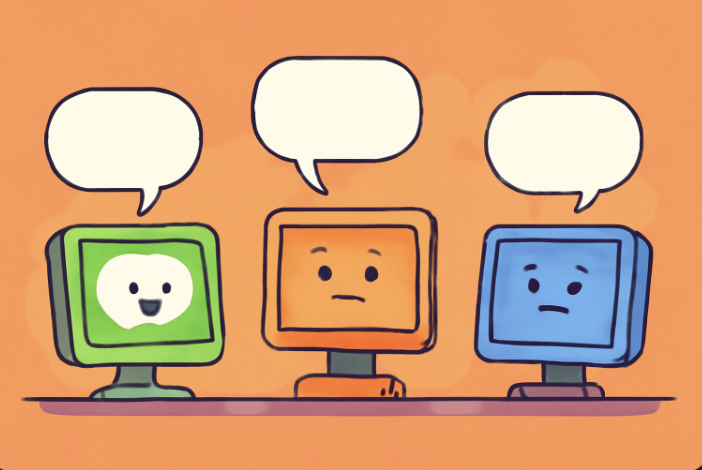By Maia Salti
 Three AI models with distinct personalities. (Image generated by ChatGPT)
Three AI models with distinct personalities. (Image generated by ChatGPT)
TL;DR
- Writing styles vary significantly: ChatGPT uses the longest sentences (15.9 words average), Gemini produces the most sentences (305 total), and Claude falls in between (14.6 words, 232 sentences)
- Emotional tones differ: Claude is most positive (72.7% positive language), ChatGPT is balanced (62.5% positive), while Gemini is most neutral (53.1% positive)
- Punctuation reveals personality: ChatGPT overuses commas (52.2%), Claude favors em-dashes (7.06% vs others under 4%), and Gemini asks the most questions (5.49% question marks) - showing these AI models have distinct communication styles that influence how we interact with them
Model Multitasking
During my time in college, I find myself bouncing between coding and mathematics on Anthropic's Claude, essay writing assistance on OpenAI's ChatGPT, and asking Google's Gemini to translate American slang into the corresponding British vocabulary.
But I noticed some interesting things. Each model had its own habits or 'quirks' that came with its writing. Was I just imagining it? Or do these models have distinct personalities?
I decided to analyze the writing styles of these three major models (ChatGPT 4o, Claude Sonnet 4, and Google Gemini 2.5 Flash) by feeding them these three prompts:
- Write a 1,000-word bedtime story about a dragon that hates treasure but loves spreadsheets.
- Imagine you're sitting alone, thinking aloud about the world. Just let your train of thought run for a thousand words.
- Debate for 1000 words about whether or not cereal is a soup
These prompts cover story-telling, argumentative/reasoning, and stream of consciousness, ensuring I get the most out of each model.
The Experiment
I analyzed their responses across four dimensions:
- Sentence Structure: How long are their sentences?
- Emotional Tone: Do they lean positive, negative, or neutral?
- Connector Words: How do they link ideas together?
- Punctuation Patterns: What are their punctuation preferences?
The sample included approximately 3,000 words from each model.
Sentence Structure
Total Sentences Written
Gemini writes the most sentences overall
Gemini wins the sentence count race with a whopping 47-sentence lead above GPT and 73 above Claude.
This suggests ChatGPT prefers complexity within sentences, while Gemini prefers complexity through sentence variety. Claude seems to take a balanced approach.
Emotional Tone: The Good, The Bad, And The Neutral
Sentiment by Model
Claude is the most optimistic AI
The emotional analysis reveals large personality differences:
Claude is the most optimistic, with 72.7% of its emotional language skewing positive.
Connectors
Most Common Connectors
The most frequently used connecting words
Gemini loves "and", using it in 45.5% of connecting situations, making it the most straightforward and additive in building arguments. It also frequently uses "then" (4.55%) and "now" (3.54%).
Punctuation Preferences
Most Common Punctuation
The most frequently used punctuation marks
GPT overuses commas at 52.22%, significantly higher than Gemini (42.71%) or Claude (39.61%). The frequent comma occurrence might be due to the longer sentences on average that the OpenAI model uses, as it tries to pack more into each sentence.
The Linguistic Personalities
Based on this analysis, I have given nicknames for each model's personality:
ChatGPT: The Amicable Rambler - longest sentences, balanced emotional tone, and uses familiar connectors that feel natural.
Claude: The Concise Optimist - Fewer sentences with moderate sentence length and the most positive and encouraging tone
Gemini: The Neutral Communicator - Shortest sentences but highest total sentence count, most neutral and objective tone, and simple, direct connectors that prioritize clarity
Why This Matters
As AI becomes a regular part of our daily routines—often my go-to assistant for hours at a time—these models are bound to influence us. Their unique personalities don't just shape how we trust and interact with them; they also impact the way we communicate, including our vocabulary and punctuation habits.
By understanding these AI personalities, we can choose the right model for the task at hand, ensuring their communication style aligns with our needs.
AI models aren't just processing text; they're developing distinct voices that reflect their training, optimization, and the preferences embedded in their design.
Methodology
Data Collection:
- Three identical prompts across all three models. Each model was prompted to write 1000 words per prompt, but word count varied slightly.
- Quote marks and paragraph spacing were removed for BigQuery to load and read the data properly
- Logged out of GPT, created a new account on Claude, and cleared Gemini memory to ensure no memory bias.
Analysis Techniques:
- Quotation marks and paragraph spacing were removed so BigQuery could load and read the data properly.
- Sentence length was calculated using word count.
- Sentiment analysis using positive/negative word dictionaries
- Punctuation pattern recognition across 9 different punctuation types
Limitations:
- Results may vary with different prompt types
- Models receive frequent updates that could affect style
- Analysis focused on English-language responses only
- Cultural and contextual factors not controlled for
Analysis code and data available on GitHub for those interested in replicating or extending this research.
Disclaimer: ChatGPT & Claude were used for a lot of the coding and visual graph creation, but all writing content, data manipulation, & analyses are my own